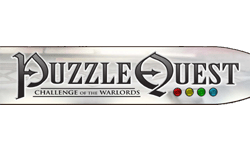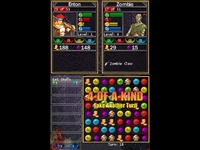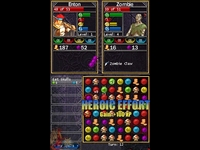|
|

|
BATTLE SYSTEM
|

|
INTERACTION
|

|
ORIGINALITY
|

|
STORY
|

|
MUSIC & SOUND
|

|
VISUALS
|

|
CHALLENGE
|
Ranges from Easy to Hard
|
COMPLETION TIME
|
40-60 Hours
|
|
OVERALL
3.0/5
|
Rating definitions
|
|
|
When a game tries to be something completely new and original, it will generally fall into one of two categories; either it works exceptionally well and delivers an outstandingly innovative product, or it falls short for whatever reasons and enters the realm of what could have been. Puzzle Quest: Challenge of the Warlords for DS unfortunately falls into the latter category, ruining what really could have been a great mix of RPG and puzzle elements with a handful of game-breaking flaws. Don't get me wrong, Puzzle Quest isn't all bad: the battle system can be a lot of fun, there are a multitude of things to do all the time, and the game is more addictive than heroin. However, its glitches and shortcomings really stand out, and turn Puzzle Quest into just another average portable game.
The power behind Puzzle Quest naturally lies in its puzzles. Everything you can do in the game, from capturing cities or training mounts to standard combat, takes place on a grid-like battlefield filled with jewels, coins, skulls, and stars. Like the popular puzzle game Bejeweled, you can spend each turn switching around two of the items on the puzzle board, in an attempt to match three, four, or five of the same icons in a row or column. Coins provide gold, stars provide experience, and skulls do damage to your enemy, with a red skull doing extra damage as well as destroying the 8 squares bordering it. Jewels show up as red, yellow, green, or blue, and matching them together will both destroy the pieces and provide you with mana of that given color. That mana will allow you to cast myriad spells which do a variety of different effects, ranging from creating new gems to doing direct damage to your opponent. You'll have to decide on a turn-by-turn basis whether to cast a spell or match a row of gems, hoping to both maximize your damage output and prevent enemies from racking up jewel combinations.
 Matching four icons will grant you or your opponent an extra turn. The computer will do this more often than you. It cheats.
Matching four icons will grant you or your opponent an extra turn. The computer will do this more often than you. It cheats.
|
|
On top of combat, the same exact puzzle grid is used for all the other functions of the game, with slight variations. Training a mount, for example, requires you to fight a given enemy with a time limit on your turns, while researching spells will have you playing solo in an attempt to fill mana quotas before you run out of possible moves. Because every single feature of Puzzle Quest uses the same exact type of puzzle, not to mention combat happens extremely often, things get very repetitive. There are 150+ different quests to take and each one will have you playing Bejeweled while exploring the map, not to mention the random enemies that pop up on roads and require even more of the same. The puzzles are not boring and can often be a lot of fun, but the sheer amount of repetition is enough to drive most gamers crazy.
And on the note of repetition, it doesn't help that the AI for every single opponent is exactly the same. Yes, each enemy has its own spell set, but enemies all have the same behaviors and patterns when it comes to moving pieces on the puzzle board. Enemies also tend to rack up combinations and get extra turns extremely often by matching up four or five jewels at once, which can be very frustrating. Because the system is so luck-driven, it gets painful; you never know if that skull is going to fall on your next turn and cause instant painful death. Other frustrations stem from both bugs and flaws in the gameplay. For one, the game has a tendency to crash fairly often; fortunately, your progress is saved automatically after every battle, but it's still inexcusable for a modern game to consistently crash in this day and age. The puzzle interface, which is driven entirely by the stylus and has no button option, takes some getting used to, and it's very easy to make mistakes on the small screen and switch pieces inadvertently. The game's difficulty ranges pretty drastically, and you'll find some battles pitifully easy while others leave you puzzled, no pun intended. Fortunately, the game allows unlimited retries for most battles, so despite the inevitable frustration that bad luck causes, things are forgiving.
Puzzle Quest takes place in the land of Agaria, a sprawling epic world filled with volcanoes, snowfields, and deserts. All of your generic fantasy creatures roam the land, ranging from elves and goblins to dragons and minotaurs. There are a handful of original creatures, but for the most part, Puzzle Quest's story reads like a stereotypical fantasy novel, filled with laughable cheesy lines and some severely one-sided characters. It's never quite explained why people in Agaria choose to settle their disputes over puzzle boards, but the story takes itself seriously nonetheless.
 Heroic Effort is the bonus you get after a certain number of combos. It's also what it takes to put this game down.
Heroic Effort is the bonus you get after a certain number of combos. It's also what it takes to put this game down.
|
|
The DS version of Puzzle Quest has its ups and downs. Despite the drawbacks of the stylus, overall it is much better than using a cursor, and allows combat to proceed quickly. Everything in the game utilizes the stylus; buttons can be used for some things, but are usually slow and clunky compared to the touch pad. The top screen is used effectively, holding stats and other useful information that can be swapped with the bottom screen using the L or R buttons, then touched for more details. The DS can't convey the same graphics as the PSP version, holding a much smaller screen, but the visuals are all that they need to be. Portraits are interesting and detailed, and the world map is pretty huge and appealing despite many sections remaining unused by the end of the game. The music is pretty easy on the ears, but a lack of variety really hurts, especially considering just how many times you have to be in combat. There are a handful of songs rotated throughout different battles, but even the final boss doesn't have his own special theme music, which is really disappointing to find.
Puzzle Quest really has a ton of things to do; four different character classes, a dozen collectable companions, a host of trainable spells and talents, tons of equipment to find and buy, forgeable items, city capturing, mount training, spell researching, and 150+ quests will provide you with tons of replay value. In theory, itís the perfect game, but its bugs, flaws, frustration, and repetition detract from its fun factor to the point where Puzzle Quest really can't be considered much more than average. Paradoxically, the game is horribly addicting yet horribly frustrating at the same time; it's impossible to put down but often infuriating to play. The idea is amazing, though, and here's hoping that more developers will take after Puzzle Quest's example and learn from its mistakes in order to usher in a new genre of "Puzzle-RPGs."
Review Archives
|









